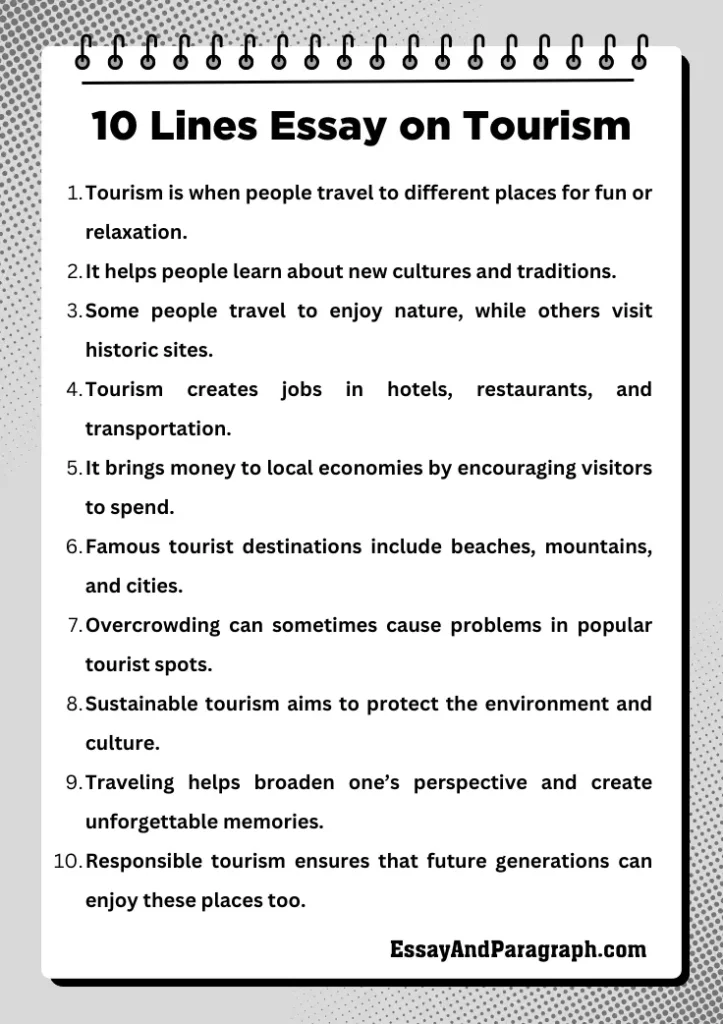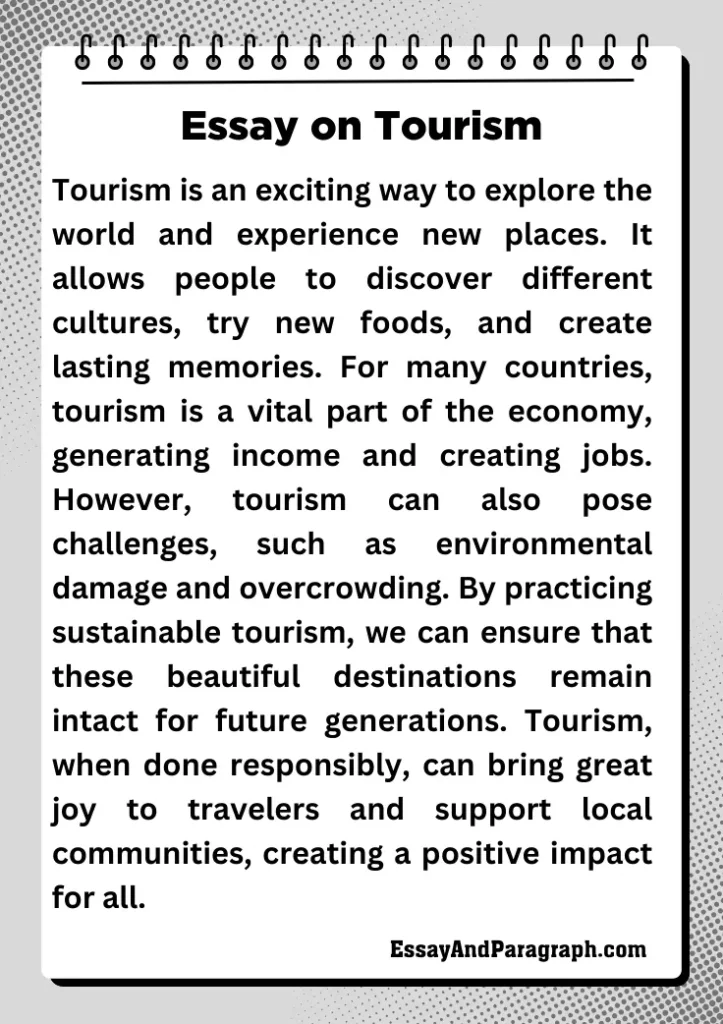Have you ever wondered what makes tourism such an important part of our world? It’s more than just visiting new places—it’s about discovering new cultures, connecting with different people, and experiencing the beauty of the world around us. Tourism has become a global activity, offering travelers new adventures while boosting local economies. In this article, we will learn how to write an essay on tourism and explore its impact on people and places.
10 Lines Essay on Tourism
Tourism is when people travel to different places for fun or relaxation.
It helps people learn about new cultures and traditions.
Some people travel to enjoy nature, while others visit historic sites.
Tourism creates jobs in hotels, restaurants, and transportation.
It brings money to local economies by encouraging visitors to spend.
Famous tourist destinations include beaches, mountains, and cities.
Overcrowding can sometimes cause problems in popular tourist spots.
Sustainable tourism aims to protect the environment and culture.
Traveling helps broaden one’s perspective and create unforgettable memories.
Responsible tourism ensures that future generations can enjoy these places too.

Essay on Tourism – 100 words
Tourism is the activity of traveling to new places for leisure, exploration, or education. It allows people to experience different cultures, enjoy nature, and relax. Tourism is important for many countries because it supports local economies by creating jobs in industries like hospitality, transportation, and entertainment. However, tourism can sometimes harm the environment and local cultures if not managed well. Sustainable tourism practices are crucial to reduce the negative impacts of over-tourism and promote environmental conservation. When done responsibly, tourism can be a rewarding experience for both visitors and the places they visit.
Essay on Tourism – 200 words
Tourism refers to the act of traveling to various destinations for leisure, education, or relaxation. People travel to explore new cultures, try local foods, visit historical sites, and experience different ways of life. Tourism contributes significantly to the economy, creating jobs in the travel, hospitality, and transportation sectors. Many countries rely on tourism as a source of income and to support local businesses. Tourists also bring new perspectives to communities, fostering cultural exchange and understanding.
However, tourism can also have negative effects on the environment and local communities. Overcrowding in popular tourist destinations can lead to the depletion of natural resources and environmental degradation. Cultural traditions may also be diluted to cater to tourists’ preferences. To combat these issues, sustainable tourism focuses on practices that minimize environmental harm and respect local cultures. Travelers can make a difference by supporting eco-friendly accommodations, reducing waste, and respecting the customs of the places they visit. By practicing responsible tourism, we can ensure that future generations can continue to enjoy the beauty and culture of the world’s most treasured destinations.
Short Essay on Tourism – 250 words
Tourism is the act of traveling for leisure, education, or business. It plays a crucial role in the global economy by contributing to job creation, infrastructure development, and local income generation. Many countries rely on tourism as a major source of revenue. People travel to explore new cultures, enjoy natural beauty, and relax from their busy lives. Popular destinations often include beaches, mountains, cities, and cultural landmarks.
While tourism brings several benefits, it also presents challenges. Overcrowding is a common issue in tourist hotspots, leading to environmental damage, such as pollution and the destruction of natural habitats. In some cases, local cultures may be commercialized or altered to meet tourists’ expectations. Therefore, sustainable tourism is essential. This concept focuses on promoting practices that protect the environment, support local economies, and preserve cultural heritage.
Tourists can contribute to sustainability by making responsible choices. This includes reducing waste, conserving resources, supporting local businesses, and respecting local traditions. By doing so, travelers can help ensure that tourism remains a positive force that benefits both visitors and host communities.
In conclusion, tourism offers unique opportunities for people to experience the world in new ways. However, it is important to approach tourism with responsibility and respect for the places we visit. Sustainable tourism ensures that these experiences continue to be available for future generations while protecting the world’s cultural and environmental heritage.
Long Essay on Tourism – 500 words
Tourism is the act of traveling to different places for leisure, exploration, or education. It involves visiting various destinations to experience their natural beauty, culture, history, and lifestyle. Tourism is one of the world’s largest industries, contributing billions of dollars to global economies. It has the power to create meaningful interactions between people, promote cultural exchange, and foster understanding.
One of the key emotional responses associated with tourism is excitement. Whether it’s visiting iconic landmarks, exploring beautiful natural landscapes, or simply relaxing in a new environment, tourism offers opportunities for personal growth and unforgettable memories. It allows people to break away from their daily routines and immerse themselves in the unknown. This sense of adventure and discovery is one of the most appealing aspects of tourism.
Tourism also has significant economic benefits. It creates millions of jobs in the travel, hospitality, and entertainment industries. Local businesses such as hotels, restaurants, shops, and transportation services rely heavily on tourism to thrive. Moreover, tourism helps in the development of infrastructure, such as roads, airports, and public transportation, which benefits not only tourists but also the local population.
However, tourism can also have negative effects. Overcrowding in popular tourist destinations can lead to environmental damage, such as pollution, waste, and the destruction of natural habitats. The influx of visitors can strain local resources, including water, energy, and food supplies. In some cases, tourism can alter local cultures, with traditional practices becoming commercialized to meet tourists’ expectations. This can lead to a loss of cultural identity and heritage.
To mitigate these issues, sustainable tourism is increasingly becoming a focus. Sustainable tourism promotes responsible travel that minimizes negative impacts on the environment, culture, and economy. It encourages tourists to adopt eco-friendly practices, such as reducing waste, conserving energy, and supporting local businesses that prioritize sustainability. Sustainable tourism also emphasizes respecting local customs and traditions, ensuring that tourists do not disrupt or harm the cultures they visit.
One important aspect of sustainable tourism is the concept of eco-tourism. Eco-tourism encourages travelers to visit destinations that prioritize environmental conservation. These destinations often feature natural attractions, such as national parks, wildlife reserves, and protected areas, where tourism activities are designed to have minimal impact on the environment. Eco-tourism promotes education and awareness about the importance of preserving natural landscapes and biodiversity.
As tourism continues to grow, it is crucial for both travelers and destinations to adopt responsible practices. The future of tourism will likely see a greater emphasis on sustainability, with travelers becoming more conscious of their environmental footprint and choosing destinations that align with their values. Virtual tourism, which allows people to explore destinations from their homes, is also expected to grow, offering an alternative to physical travel and reducing the strain on popular tourist spots.
In conclusion, tourism is an essential part of the global economy and offers numerous benefits to both travelers and local communities. It promotes cultural exchange, fosters understanding, and generates income. However, it also brings challenges that must be addressed through responsible practices. By adopting sustainable tourism, we can ensure that future generations continue to enjoy the world’s natural beauty and cultural heritage.
FAQs on Tourism
1. What is tourism?
Tourism is the activity of traveling to different places for leisure, exploration, education, or relaxation. People engage in tourism to experience new cultures, learn about different histories, or simply enjoy the beauty of nature. It is one of the largest industries in the world, bringing significant economic and cultural benefits.
2. How does tourism benefit the economy?
Tourism benefits the economy by creating jobs in sectors like hospitality, transportation, and entertainment. Tourists spend money on hotels, restaurants, attractions, and services, helping to support local businesses. Many countries depend on tourism to fuel their economies, with tourism contributing to income, employment, and infrastructure development.
3. Why is sustainable tourism important?
Sustainable tourism is important because it helps protect the environment and preserves the local culture of the places people visit. By adopting eco-friendly practices, such as minimizing waste and supporting local businesses, tourists can reduce their negative impact. Sustainable tourism ensures that destinations remain intact and vibrant for future generations to enjoy.
4. How can tourism harm the environment?
Tourism can harm the environment in several ways, such as pollution, waste, and overuse of natural resources. Popular tourist destinations may suffer from overcrowding, which can lead to the destruction of fragile ecosystems and habitats. Protecting the environment through responsible tourism practices is essential to maintaining the beauty and health of the planet.
5. What are some ways to travel responsibly?
To travel responsibly, tourists should reduce waste, choose eco-friendly accommodations, use public transportation, and respect local cultures. Supporting sustainable businesses, like those that promote conservation, and avoiding excessive consumption are also key. Being mindful of your environmental impact helps ensure that tourism remains beneficial to both visitors and the places they visit.
Top 5 Quotes on Tourism
“The world is a book, and those who do not travel read only one page.” – Saint Augustine
“Tourism is the only industry that generates income without producing anything.” – Unknown
“Travel is the only thing you buy that makes you richer.” – Anonymous
“Take only pictures, leave only footprints.” – Chief Seattle
“To travel is to take a journey into yourself.” – Danny Kaye
Summary on Tourism
Tourism is an exciting way to explore the world and experience new places. It allows people to discover different cultures, try new foods, and create lasting memories. For many countries, tourism is a vital part of the economy, generating income and creating jobs. However, tourism can also pose challenges, such as environmental damage and overcrowding. By practicing sustainable tourism, we can ensure that these beautiful destinations remain intact for future generations. Tourism, when done responsibly, can bring great joy to travelers and support local communities, creating a positive impact for all.




